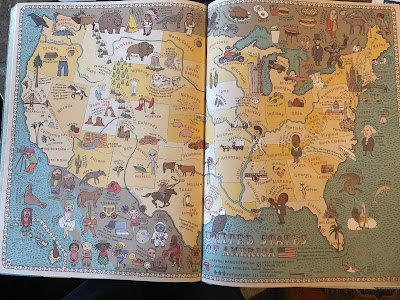EVENTS Breaking into the US market

Stephanie Cotela reports on SCBWI-BI’s Breaking into the US Children's Book Market webinar, held on the 6th of November 2021.
Covering the business side of things, the agents discussed a range of topics including the ins and outs of filing tax forms, publishing rights and the benefits of having a UK agent versus a US agent.
General takeaways:
- UK authors are exempt from paying tax on royalties from their US book sales, however they must complete the necessary paperwork to claim exemption, and foreign income will still need to be declared on UK personal or company tax returns.
- For picture books, UK publishers commonly hold world rights due to the fact that the UK market isn’t big enough to recoup the printing costs. The market in the US is much bigger and therefore publishers will not always require world rights.
- Novels are more complicated as language rights are divided into territories – UK and US, but the rest of the world is an open market, in which case, translation rights come into play.
- Obviously, it’s easier to have an agent in your own time zone for ease of communication and contact. But if you’re going to pitch to US agents, ensure your book is internationally marketable, ie, a niche topic focusing on local British culture will be of little interest to US readers.
- Brexit and Covid complicated things but everyone agreed that the biggest positive was virtual events. Not only did Zoom, Microsoft Groups, et al, allow us to wear pyjamas from the waist down, online events brought people together, regardless of travel restrictions. Authors were able to extend their reach to schools in rural or remote areas and those with lower budgets, and worldwide events became accessible to those physically, financially and time challenged, with recordings an added bonus.

(Top l to r): Sam Smith and Andrew James, with Becca Langton, photobombed by Stephanie's cat!
[Picture credit: Stephanie Cotela]
The afternoon session featured Sam Smith, publisher for fiction, non-fiction and picture books at Macmillan Children’s Books and Becca Langton, literary agent at Darley Anderson.
Sam shared an insight into her decision to focus on British authors, and Becca Langton discussed her vision to expand into the US market.
When asked about the main difference between the two markets, Becca’s tips included:
- An interesting voice is necessary in both but there is more space for YA in the US.
- The US is less compelled by writers with a British voice, but fantasy crosses over more easily (as these worlds are fictional and universal).
- Important to note that marginalised voices are different on either side of the pond.
Sam’s insight echoed Becca’s, and dived deeper into the US market specifically:
- The broadness of the US market allows region-specific plots, language, themes.
- Stronger institutional market.
- Librarian reading lists sell books (an example was given of a library in Texas that encouraged the sale of 20,000 copies of a recommended book).
- More adults read YA in the US.
- Netflix frequently goes to YA novels for inspiration.

Differences in art style and bookshop placement make an impact.
[Picture credit: Jaredd Craig, Unsplash]
Bestselling graphic novels in the US include:
- The InvestiGators series by John Patrick Green.
- DogMan, Captain Underpants and CatKid by Dav Pilkey.
On the other hand, mega-selling author David Walliams doesn’t sell in the US because his British-specific humour doesn’t translate. In general, the US to UK is an easier sell, especially for humorous books.
The topic of agents selling rights is a bit more complicated. As Sam explained, agencies naturally want to hold rights and publishers always want world rights, especially if they have creative stakes in the project. We’re talking about global sales and film rights here. World rights is a big deal and a much longer investment. The bigger the project, the more work, both editorially and artistically, which means putting it into the publisher’s hands is the better option.

Bestseller in the US: The InvestiGators.
Once a project is optioned, it’s still a long uphill battle from book to screen. In the first place, it takes ages for a film to come to fruition and, more importantly, lots of things that are optioned are left on the cutting room floor.With that in mind, Becca’s sound advice is, “write the book you want to write, don’t write to the market.”
Genres such as graphic novels, work better in the US than the UK
A word on book covers:
We’ve already noted that UK book covers tend to be child-centric. More specifically, UK covers tend to be decorative and iconic whereas covers in the US more commonly depict scenes and are often painterly.
Picture Book trends:
- Biggest difference is art style.
- UK – more into toilet humour.
- US – painterly (ex: Where the Wild Things Are).
- UK – Jim Field’s Oi series – this style isn’t as strong in the US.
- Rhyme is different due to accents, doesn’t always translate well.
- Sight words different as reading/phonics is taught differently.
Overall takeaways:
- Focus is on unique voices, inclusivity, diversity and authenticity in both markets.
- The ultimate goal is to respect the author, but sometimes words or phrases need to change according to the market.
- Social Media presence is an added bonus, not a deal breaker.
- Worthwhile for authors to be involved in communities such as SCBWI for support, guidance and networking.
*Header image: from Maps, Big Picture Press.
**************************************************************************************










No comments:
We love comments and really appreciate the time it takes to leave one.
Interesting and pithy reactions to a post are brilliant but we also LOVE it when people just say they've read and enjoyed.
We've made it easy to comment by losing the 'are you human?' test, which means we get a lot of spam. Fortunately, Blogger recognises these, so most, if not all, anonymous comments are deleted without reading.